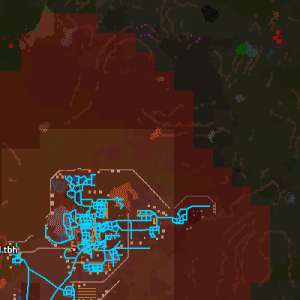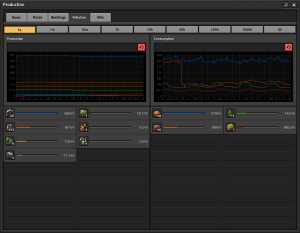Pollution


Pollution is represented as an abstract "cloud", updated per chunk every game second (60 ticks) and visible on the map, when "alt-view" is on (default Alt-Key). It appears as a red colored blocky cloud.
It is produced by many buildings involved in processing items and spreads outwards at a steady rate.
The evolution factor is not increased by the spreading/absorbed pollution, but by the pollution produced by all the player's machinery at every tick. This means that no matter how hard the player tries to contain the pollution, enemies will still evolve at the same rate. They just won't attack the player as frequently. The pollution cloud is used to trigger biter attacks and determines the size of the attacks.
Pollution settings can be changed via map generation settings, or can be disabled entirely.
Pollution spread
As soon as a chunk has reached 15.0 pollution it starts spreading in all four cardinal directions at a rate of 2% per game-second (60 ticks).
For example, a chunk with 400.0 pollution and 4 adjacent chunks with 100.0 pollution each, raises the pollution in all adjacent chunks by 8.0 while reducing its own pollution by 32.0. But every one of the 4 surrounding spreads 2.0 pollution "back" to the center chunk, so it only loses 24.0 + absorbed value.
Pollution dissipation
- Every chunk (32x32) of map slowly reduces the pollution it covers (See Pollution#Chunks). So the more the pollution spreads, the more is absorbed.
- Trees also absorb some pollution (See Pollution#Trees).
- Spawners absorb a great amount of pollution, and use this to assign enemies to attacks.
Native life
Pollution attracts biters to the Player's factory. Biters who find themselves in a polluted area will attempt to reach the source of pollution and destroy it.
If a chunk's pollution is greater than 20, each enemy spawner absorbs 20 + 0.01 * [chunk's pollution] every game second (60 ticks), otherwise it absorbs 3 times the amount of pollution needed for the most expensive unit it can spawn for the current evolution factor.
Higher pollution values decrease the time it takes for biters to join the attack force. After a certain amount of pollution is absorbed the spawner sends one of its biters/spitters to a rendezvous point. Every 1 to 10 minutes (random) the mustered biters launch an attack. If not all biters have arrived at the rendezvous point by that time, they will wait up to an additional 2 minutes for stragglers.
Required pollution to add an additional biter/spitter to the attack wave:
| Pollution | Type |
|---|---|
| 4 | Small biter |
| 20 | Medium biter |
| 80 | Big biter |
| 400 | Behemoth biter |
| 1 | Small spitter |
| 12 | Medium spitter |
| 30 | Big spitter |
| 200 | Behemoth spitter |
Modules
Modules that list "+x% pollution" increase pollution multiplier, not a flat pollution rate. Final pollution value is (pollution multiplier * energy usage multiplier * base pollution), meaning heavily boosted buildings are likely to account for most of the pollution produced in a factory.
Production/Absorption
These tables contain information about the levels of pollution produced/absorbed by items in the game.
Polluters
| Structure | Pollution per second at full power |
|---|---|
| Stone furnace | 2 |
| Steel furnace | 4 |
| Electric furnace | 1 |
| Burner mining drill | 12 |
| Electric mining drill | 10 |
| Pumpjack | 10 |
| Assembling machine 1 | 4 |
| Assembling machine 2 | 3 |
| Assembling machine 3 | 2 |
| Boiler | 30 |
| Oil refinery | 6 |
| Chemical plant | 4 |
| Centrifuge | 4 |
Fire on the ground and burning trees produce 0.005 pollution per second.
De-polluters
Spawner
If a chunk's pollution is greater than 20, each enemy spawner absorbs 20 + 0.01 * [chunk's pollution] every game second (60 ticks), otherwise it absorbs 3 times the amount of pollution needed for the most expensive unit it can spawn for the current evolution factor.
Chunks
Every chunk has a natural absorption rate per second which is determined by the sum of the pollution absorption of its floor tiles.
Following numbers are the pollution reduction for a single tile per second.
| Tile | Pollution per second |
|---|---|
| Grass 1-4, landfill | 0.0000075 |
| Dirt 1-7, dry dirt | 0.0000066 |
| Sand 1-3 | 0.0000058 |
| Red desert 0-3 | 0.0000066 |
| Water, green water, deep water, deep green water, shallow water, mud water | 0.000005 |
| Path tiles (Stone bricks, concrete etc) | 0 |
| Out of map | 0.00001 |
| Special tiles (Lab tiles, tutorial grid) | 0 |
Trees
Every single tree absorbs a small amount of pollution in its chunk per tick. If the total pollution in that chunk is above 60 units, trees lose their leaves for every 10 pollution absorbed. The less dense the leaves, the slower the tree absorbs pollution.
Achievements
Pollution is directly connected to the following achievement:

|
It stinks and they don't like it |
History
- 0.17.12:
- Added pollution tab to the production statistics.
- Spawner tooltip (including the pollution statistics), shows distribution of biters spawn for the current evolution factor with the pollution costs.
- Pollution generation is now shown in the x/s format both on the entity and in the item/crafting slot.
- Internal pollution values have been normalized, and they are now roughly 60 times less compared to what they were.
- 0.17.0:
- Rebalanced assembling machine 1,2 and 3 power consumption and pollution - higher tiers eat more power, but produce less pollution.
- Changed spawner pollution absorption logic so that all the pollution on a chunk doesn't build up un-spent in a single spawner.
- 0.13.2:
- Optimized rendering of huge pollution clouds on the map.
- 0.13.0:
- Large amounts of pollution is created when burning fires.
- Pollution creation of the productivity module was reduced drastically.
- Optimized pollution rendering on map and minimap.
- 0.8.0:
- Added option to turn off pollution visibility even when detailed info is on.
- 0.7.1:
- Speed modules no longer produce extra pollution.
- Added missing pollution descriptions.
- Pollution is only shown on the minimap with alt mode on.
- 0.7.0:
- Introduced concept of pollution.





